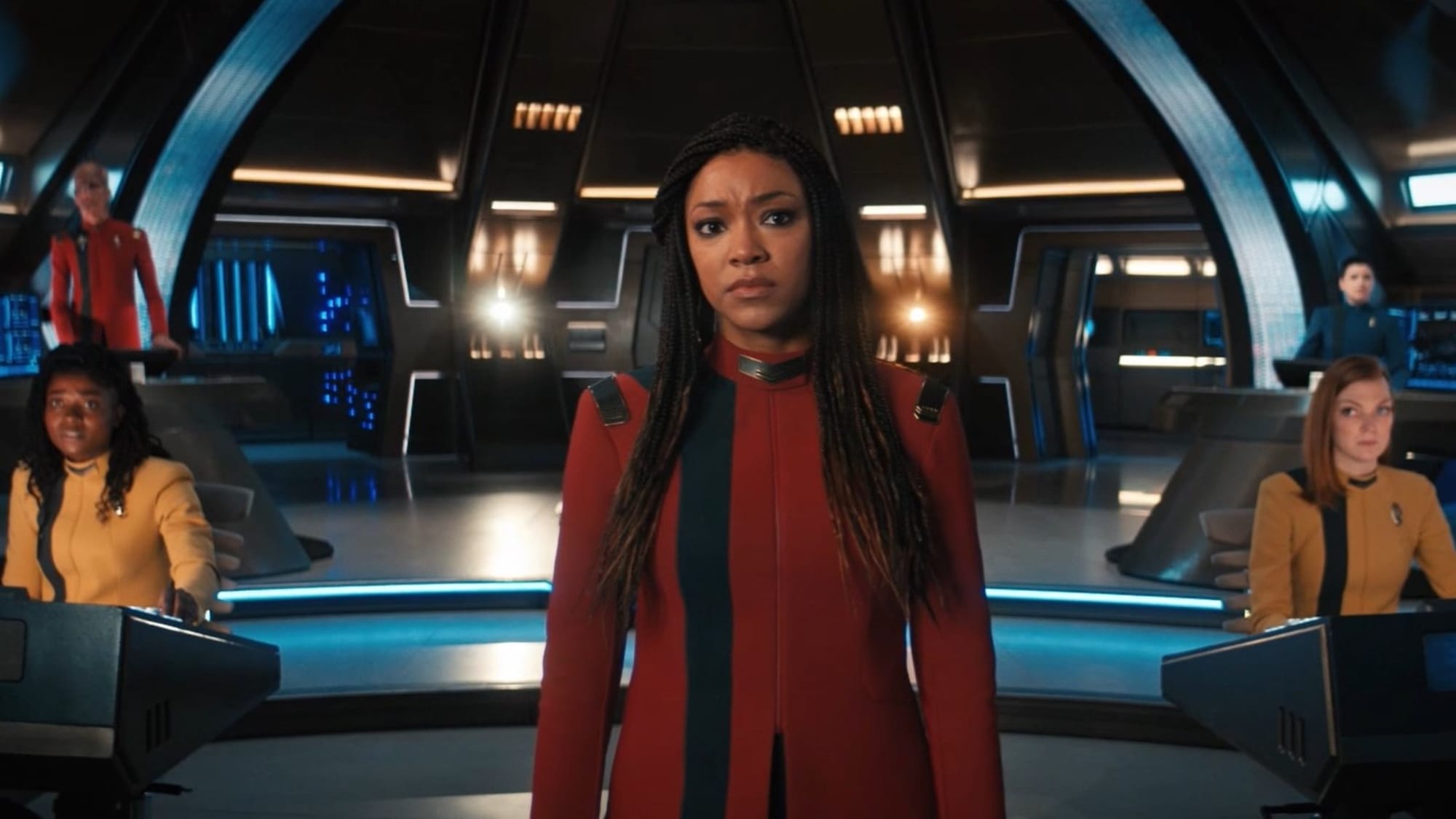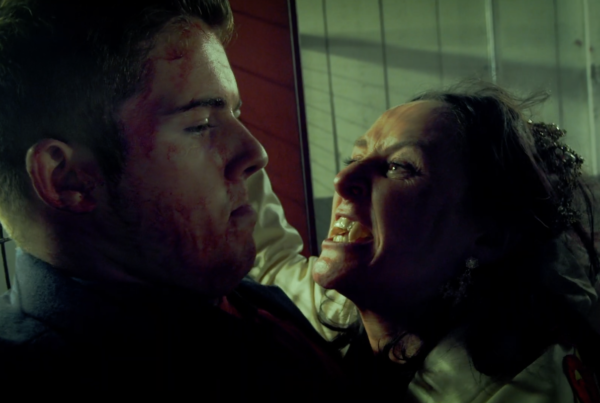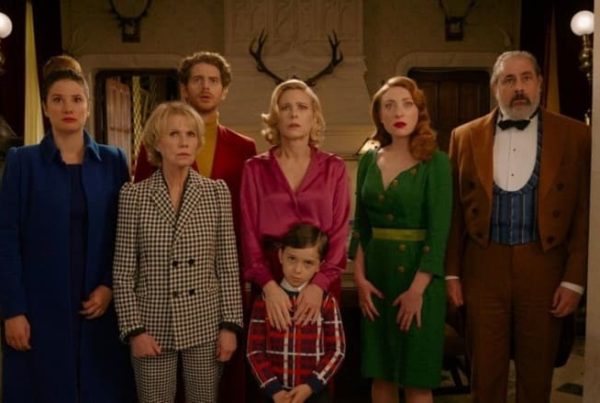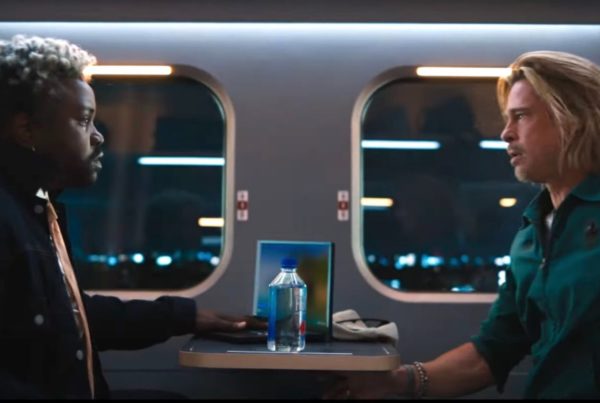Episodes 1-13
Showrunners: Michael Kurtzman, Michelle Paradise
Starring: Sonequa Martin-Green, Doug Jones, David Ajala, Anthony Rapp
The flagship of new Trek, but four seasons in and Star Trek: Discovery doesn’t quite feel as if it has its footing yet. It’s not surprising; with a change of showrunner in the first season, a second season that was partially a backdoor pilot for Strange New Worlds, a third season that catapulted us almost a thousand years into the future and required a lot of worldbuilding to get by, Season Four in some ways marks the first season where Discovery truly gets to be its own thing.
When a gigantic Dark Matter Anomaly (the DMA for short) threatens the stability of the newly re-emergent Federation, it is up to the crew of the USS Discovery to attempt to solve the mystery behind it. However as newly promoted Captain Michael Burnham (Sonequa Martin-Green) struggles with the political aspects of the task and the more stable 32nd century Federation that she helped to bring about, Cleveland Booker (David Ajala) must deal with the destruction of his homeworld – the first planet swallowed by the DMA.
Discovery has certainly found the voice of its characters, established its style, but until this season it hasn’t really properly articulated its mission statement. Here we see the crew continuing with their efforts to restore the Federation and bring some of the former core worlds back into the fold. It provides consistency between the last two seasons, finally providing that much needed purpose that stretches beyond the demands of the season arc. This season again seems to reach back to the original Star Trek, but where Season Two did this with legacy characters, this season instead touches on some of the core concepts upon which Roddenberry founded the series – that of understanding alien cultures and seeking to bridge differences.
Unfortunately this is still a patchy season, doing a lot right in terms of the core concepts but failing in terms of pacing, some of its dramatic elements, and a few points of characterisation. As admirable as the slower, more scientific-based approach of the season is, it’s not helped by a number of episodes that feel more like filler than plot (Choose to Live, All is Possible, All In, and Rosetta). Similarly, despite an excellent performance and some good backstory, the motivations of the villain of this season occasionally lurch towards cartoonish ridiculousness. Finally Discovery can often tend towards melodrama, over egging its actions and underplaying the consequences. Suicidal missions are often uneventful, people can get hurled around a bridge by a gravimetric anomaly and walk it off the next second. It robs the scene of the dramatic tension built up mere seconds before and leaves the audience feeling cheated.
Which is ironic as the one thing Discovery does better than other Trek is dealing with emotional consequences. The characters have developed over the seasons and we’ve seen them actually struggling to deal with the massive upheavals they’ve undergone. Detmer’s (Emily Coutts) PTSD in Season Three, Culber (Wilson Cruz) feeling swamped with added work pressure, Burnham allowing herself to embrace her human emotions despite her Vulcan upbringing – all have been organically woven into the series, rather than being just the focus of an episode (as is so often the case in Star Trek). Hence Book’s grief at the loss of his homeworld is key to this season, shaping much of the drama of the later half, and shines a spotlight on David Ajala’s acting talent, as his quiet voice conveys the weight of such pain.
This season also shifts the politics of the Federation into a sharper focus, with the introduction of Laira Rillak (Chelah Horsdal) as the president of the Federation. Considering how Burnham has been shown to buck against authority when her methods are challenged it’s good to see Rillak positioned as a foil to her, taking in larger political considerations that Burnham is unable to account for. It’s great to see dramatic tension come from someone positioned not as a directly opposed enemy, but merely with an agenda that is slightly different from the crew’s own. It moves viewers into the mindset of considering the whole picture, rather than just the mission.
Finally, no discussion of Discovery would be complete without mentioning Doug Jones. Saru has been one of the standout characters of the series, as he’s often acted as a calm supporting voice (when not undergoing Vahar’ai ) and a nurturing figure to the crew. This season we unexpectedly got a romantic arc for the Kelpien first officer, and it was a delight. Jones and Tara Rosling (playing the Vulcan president of Ni’Var) have some undeniably sweet chemistry in their scenes. It was genuinely one of the highlights of the season to watch this tentative relationship blossom, and although unexpected, it seems totally organic.
Overall, despite a strong ending, this seems like a bit of a middling season of Star Trek: Discovery, but one that feels more grounded and stable than the ones that have gone before it.




